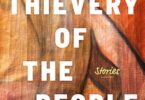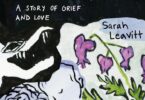by Brett Josef Grubisic
Howdy Barbara, greetings from the left coast,
Such an outpouring of outraged sentiment today in your diatribe against the recognition of Raziel Reid’s so-called “values-void” novel. Most of your words struck me as angry and muddled in equal parts. I can’t help but reply.
Honestly, when I first saw that emphatic newspaper headline — “Wasted Tax Dollars on a Values-Void Novel” — I assumed clickbait, you know, that iffy online strategy of using sensational titles or irresistible promises so that a gullible viewer reaches for their mouse (and thereby generates ad revenue for the business).
Fool that I am, I clicked anyway.
So, you’re offended at a “waste of tax dollars” (a negligible amount, really, when it comes to tax dollars), because you evidently believe that money awarded to literature should serve only the greater good (as defined by you, of course). Instead of a “values-void” novel, you expect one that’s positively stuffed with values. You say:
“I’ve read the novel. What were they thinking? No, seriously, what were their criteria? If I were an awards committee member, I’d lean to a recognizably Canadian novel in which the protagonist’s struggles to emerge from conflict lead to self-knowledge and the promise of positive maturation.”
Ah, dogma. There’s nothing like that standardized and unwavering approach to literature. Literature as cod liver oil: it’s so good for you and good for the strong, uniform state. That view, though. It’s so … Soviet-era.
Still. The implicit rules you advocate would save hardworking Canadian taxpayers — all of us — so much money. I can picture that utopian scene now. Instead of having a jury engage in challenging and ongoing annual debate about what literary work is meritorious and why, all we’d have to do is input a single, quantifiable question: “Which of the hundreds of Canadian novels published this year has the most recognizably Canadian location and characteristics and features a protagonist whose struggle to emerge from conflict most evidently indicates the promise of positive maturation?” The computation would take mere minutes.
As a bonus, this formulaic approach would help authors too, because they would come to understand the one true and uplifting purpose of prize-awarded literature: photo-realistic descriptions of Canadian settings/themes and all plots leading to positive maturation. Ambiguity? Deviating from the norm? Individual style? Who needs it?!?
Then you find fault elsewhere. Instead of not being Canadian enough, When Everything Feels like the Movies gets too explicit for you:
“Jude’s first experience in anal penetration is graphically described. We’re not in Green Gables anymore, Toto.”
Such a curious choice or words — with Avonlea arguably already a sanitized fantasy of town life when Lucy Maud Montgomery envisioned it over 108 years ago. Yep, a decade before WWI ended. Were you really intending to re-introduce Edwardian values as a benchmark of civility?
The longest paragraph of your tirade is dedicated to describing sex. You never state specifically what’s wrong with the novel’s descriptions of sex, but the moues of distaste are right there in each sentence. A teenage boy is obsessed with sex, and this upsets, distresses, and strikes you as unseemly, a subject that’s inappropriate for an audience of teens and adults? Really? Unless your notion of teenagers envisions the Brady family or the Von Trapps, I’m guessing you can’t help but be aware that teens and sex are like books and pages: you can’t have one without the other.
As for a graphic description of anal sex, perhaps the author would have ruffled your feathers less if he’d used a delicate cloak of decorous metaphors and coy but lyrical euphemisms? Or if he’d skipped the fact of “anal” altogether?
Oh, incidentally: “Raw and blunt, ugly-coloured as a wound, it looked to me vulnerable, playful, and naive, like some strong-snouted animal whose grotesque simple looks are some sort of guarantee of good will … His breathing became loud and shaky, now he worked furiously with his hand, moaned, almost doubled over in spasmodic agony.” That’s Del Jordan, the narrator of Lives of Girls and Women. Written by Alice Munro over four decades ago. A fascinated high school student, Del’s watching Mr. Chamberlain, an adult friend of her mother’s, as he masturbates in front of her. Does this also strike you as offensive? “Values-void”?
Your article jumps around next: “Indeed, we’re not anywhere recognizable. Province? State? East? West? Jude’s town isn’t even named.”
Is it Tokyo? Oslo? Mexico City? No, it’s not. If the author has chosen to set the story in a North American suburban anyplace, maybe that’s his point. If the architectural features and cultural attributes of a generic suburban development outside of Toronto or Vancouver or Seattle are interchangeable, is that not a comment about the nature of the recognizable place?
Another jump on your part: “As for moral growth, there is none.”
Where’s the Old Testament tablet of literary commandments that states Thou Shalt Portray Moral Growth? Hmm, maybe the acclaimed British author Peter Ackroyd says it better than I can: “But there are many people indoctrinated with this belief that somehow literature is a branch of ethics, or a branch of sociology … You don’t learn anything from a novel, your ethical responses aren’t sharpened, your moral relations with the world aren’t purified. Nothing of the kind. You can read all of Tolstoy three times over, you won’t be a better person. You’d probably be worse, you’d be so much more boring — you’d talk about it.”
You wind down your article with the supposed lesson you expect literature to preach: “The message I draw — and think young people will too — is that the ‘authentic’ narcissism of queer/transgender identity exempts one from the obligation to mature.”
Wow. Here, with some textual sleight-of-hand, you blur an important distinction. Even if I accept your interpretation of the novel’s singular “message” (I don’t, in fact), there’s nothing at all in Reid’s book that suggests his adolescent character is supposed to be understood as representative of an entire group of diverse living people, in this case queers, or permission for them to embrace amoral narcissism. A reader might come to believe that the narrator (one character in one work of fiction) believes he’s exempt from the obligation to mature. If you believe that queer readers will understand the novel’s anti-hero as giving them — all of them — the go-ahead to never mature, you are seriously overestimating the persuasive strength of any art form as well as the radical susceptibility of individuals, who in your view seem little more than sheep in a brainless herd.
And lastly: “I’d not have wasted tax dollars on this values-void novel. So I must assume that the committee took a kind of sophisticated approach to their deliberations that I am too culturally superannuated and simplistic to appreciate.”
I love this bit; it’s a classic rhetorical strategy — you taught composition classes for more than two decades, so you must know all about that. Instead of being part of the cultural elite or an out-of-touch Ivory Tower type (despite your BA and MA), you’re putting on drag as one of the common sense folk, lacking sophistication and complexity, yes, but somehow, as a result of these put-on salt of the earth traits, able to see truths that eggheaded sophisticates cannot. It reminds me of when Ivy League politicians put on a hard hat and shake hands with men in plaid flannel shirts. I’m not sure who the performance is for, but I’m not convinced.
Now that I’ve vented spleen I’m feeling much better, so thanks. I can’t say I enjoyed your article at all, but responding did me some good.
Until next time,
Brett
Vancouver






I love this article! Writer Erika Thorkelson tweeted Barbara Kay and then Storified their conversation:
https://storify.com/ethorkel/preening-moral-vanity-a-conversation-with-barbara
The thing is, the author never intended this as a young adult novel. It was written with adult readers in mind. It’s absurd that the publisher entered it as a kid book. And more absurd that it won for best children’s literature-text category. If I were the author I’d be pissed. If I were a parent I’d be pissed. It may be an excellent book, but this isn’t kid’s stuff.
Compare it to Alice Monro if you will, but her book didn’t win best children’s lit. Because it wasn’t.
Good work, Brett Josef Grubisic. This is a fine rebuttal to an arbiter of good taste who wants to bulldoze their moral values over a work that simply disagrees with them. I think that Arsenal Pulp Press could pull a good quote out of Barbara Kay’s article … and use it as a blurb on the back cover of of Raziel Reid’s novel.
Zing! Thank you, Brett! Reading this response did me good. Hear, hear!
this is amazing.